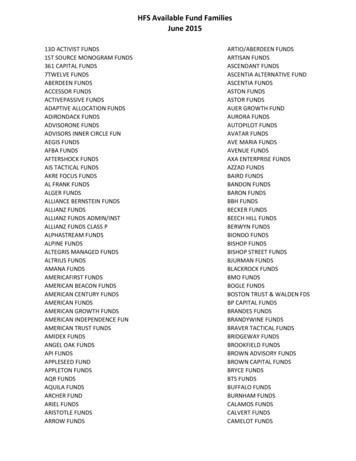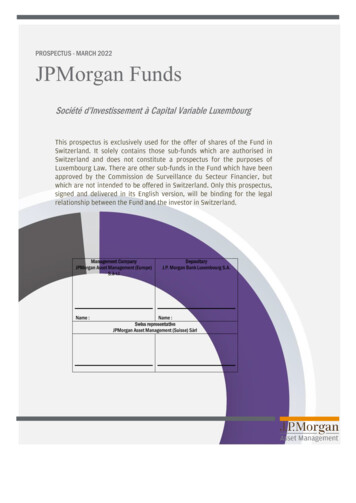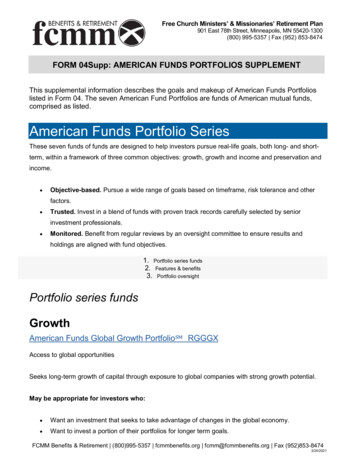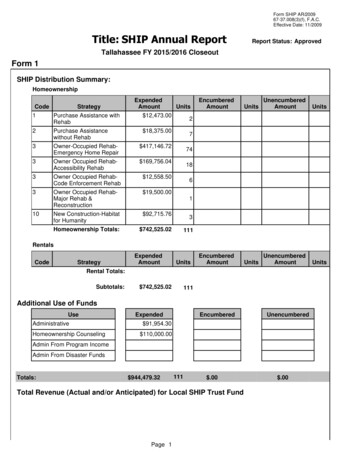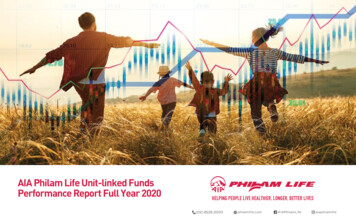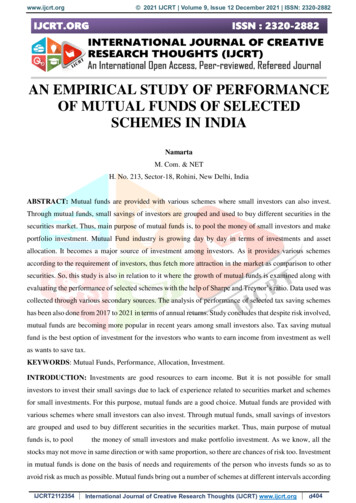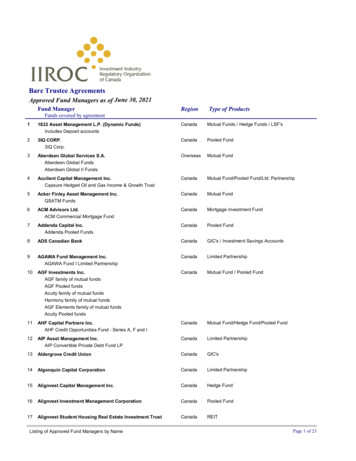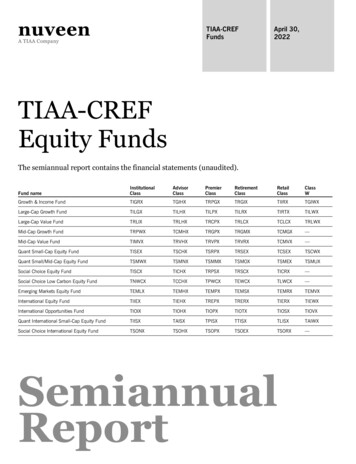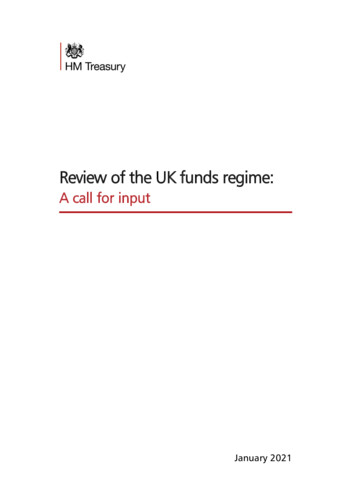
Transcription
Review of the UK funds regime:A call for inputJanuary 2021
Review of the UK funds regime:A call for inputJanuary 2021
Crown copyright 2021This publication is licensed under the terms of the Open Government Licence v3.0 exceptwhere otherwise stated. To view this licence, visit /version/3.Where we have identified any third party copyright information you will need to obtainpermission from the copyright holders concerned.This publication is available at: www.gov.uk/official-documents.Any enquiries regarding this publication should be sent to us atpublic.enquiries@hmtreasury.gov.ukISBN 978-1-911680-18-5PU3060
ContentsForeword2Chapter 1Introduction3Chapter 2The UK's approach to funds taxation8Chapter 3The UK's approach to funds regulation15Chapter 4Opportunities for wider reform21Annex AList of questions291
ForewordThe UK’s financial services industry is a national asset. It employs over a millionpeople, represents around 10% of total tax revenues and exceeds 20 billion inexports. Asset managers sit at the heart of this industry, supporting sectors frominsurance to banking, channelling capital into productive investments and at thesame time helping millions of individuals save and invest.For the last three years I have had the pleasure of chairing the Asset ManagementTaskforce, which has focused on ensuring the UK’s asset management industry canrealise its full potential. The UK funds regime has been a key focus and the UK FundsRegime Working Group made its recommendations to the Taskforce last year,providing the backdrop for this wide-reaching review encompassing regulation anddirect and indirect tax.This is a key moment for our economy, as we move forward in our new relationshipwith the EU and seek to rebuild from the COVID-19 pandemic, and theopportunities are clear. Improvements to the funds regime will result in a widerrange of more efficient investments, better suited to investors’ needs. With thecorrect fund structures, tax regime and regulatory environment, we can unleash theinvestment into productive and green technologies that will enable us to meet thisgovernment’s ambitious and pioneering commitment to net zero by 2050. Andgrowing the number of funds located in the UK can also level up our economy, bysupporting jobs outside of London; funds are a major employer of jobs across theUK, with the sector already having a notable presence in Edinburgh, Manchester,Leeds, Nottingham, Bolton, Glasgow, Stirling, Essex, Swindon and Dorset.I look forward to seeing the detailed proposals that emerge from this call for input.John Glen, Economic Secretary to the Treasury2
Chapter 1IntroductionBackgroundThe UK asset management sector1.1The UK is already an attractive location for asset management. The UK’sasset management industry is the largest in Europe and the second largestglobally, with around 9.9 trillion assets under management.1 The industrycontributes around 1% of the UK’s GDP,2 generating significant tax revenueand employment: currently around 113,000 people are employed eitherdirectly by asset management firms in the UK or in areas that result from orsupport asset management activity.31.2UK funds and asset management firms are key to the management of thesavings and pensions of millions of people across the UK, the EU andglobally. They support the process of raising capital from investors whorange from pension funds to individuals and corporates, and the efficientallocation of investments across global capital markets. They play a vital rolein economic growth by providing funding to businesses at all stages of thelife cycle, whether that be a start-up, scale-up or international conglomerate.1.3The asset management industry includes portfolio management and fundadministration. Portfolio management involves making decisions on how afund’s assets are invested while fund administration involves setting up andrunning fund vehicles, including services such as processing statements andmanaging investors’ subscriptions and disinvestments. The UK is already aleading jurisdiction for portfolio management, but the government has beentold that the UK’s overall strength in asset management could be built onfurther by addressing barriers to establishing and running funds within theUK.The review of the UK funds regime1.4At Budget 2020 the government announced that it would carry out a reviewof the UK funds regime to consider reforms which hold the potential toenhance the UK’s attractiveness as a location for asset management and for1 The Investment Association Annual Survey, September 2020 /20200924imsfullreport.pdf), p. 12.2 The contribution of asset management to the UK economy, July 2016 omy.pdf.pdf), p.7.3 The Investment Association Annual Survey, p. 96.3
funds in particular. Alongside this call for input the review also encompassestwo separate workstreams, which were also announced at Budget.1.5First, the government consulted on the tax treatment of asset holdingcompanies (AHCs) in alternative fund structures. On 15 December 2020, thegovernment responded to its AHCs consultation and launched a furtherdetailed consultation on these AHCs proposals. Second, the governmentcommitted to reviewing the VAT treatment of fund management fees, whichthe government intends to take forward in 2021.1.6This call for input sets out the objectives, scope and next steps for the widerreview, which are outlined in this introductory chapter. The remainder of thisdocument seeks views to help HM Treasury identify which reforms should betaken forward and how these should be prioritised.Objectives1.7The overarching objective of the review is to identify options which will makethe UK a more attractive location to set up, manage and administer funds,and which will support a wider range of more efficient investments bettersuited to investors’ needs. Further detail on this objective is set out below.1.8When considering proposals, the government is clear that any tax reformswill be compatible with its robust approach on avoidance and evasion, andwith the UK’s international commitments. They will also ensure the UK caneffectively exercise taxing rights over UK source income. Similarly, anychanges to regulation will support the UK’s commitment to upholding thehighest standards of regulation and appropriate supervisory oversight andinvestor protection. The government recognises that the UK’s robustregulatory regime and its commitment to upholding these standards are keystrengths across financial services, including funds.Growing the UK asset management industry1.9UK expertise in portfolio management is already a global export. Enhancingthe attractiveness of the UK funds regime will help to open opportunities forasset managers to sell UK funds around the world and offer the potential tofurther grow assets under management in the UK. Enhancing the reputationof the UK for fund location and administration can therefore go hand inhand with cementing the UK’s status as a world-leading hub for portfoliomanagement.1.10The government also recognises the global nature of this market, and thatthe success of investment funds relies on the ability for asset managers toselect the best expertise from around the globe. This is underpinned by theportfolio delegation model which allows funds to outsource portfoliomanagement to other jurisdictions and which allows the international assetmanagement ecosystem to continue providing the best possible outcomesfor consumers and businesses globally. The government remains completelycommitted to supporting portfolio delegation from and to the UK as ameans to promote market efficiency, investor choice and to reflect theinternational nature of financial markets.4
Supporting jobs across the UK1.11Fund administration jobs do not need to be located in existing UK financialservices hubs, and indeed are already distributed across the country.Increasing the number of funds domiciled and administered in the UK cantherefore support jobs right across the UK, building on the existing position.The government is actively seeking views on how to support the growth ofsuch fund administration clusters outside of London and the South East.Enabling investors to meet their goals1.12The UK funds regime can play a key role in ensuring the asset managementsector can fulfil its economic purpose by enabling investors to meet theirgoals and by allocating capital to the economy. It can help to ensure thatthere are effective products for the retirement income and drawdownmarket, which has been transformed since the Pensions Freedoms reforms,and to meet the needs of defined contribution (DC) pension schemes, whichhave grown substantially since the introduction of automatic enrolment andwhich will continue to grow.1.13One way the UK funds regime can do this is by improving the routesthrough which capital can be committed into long-term assets. TheDepartment for Work and Pensions has recently undertaken a consultationproposing to make it easier for DC schemes to invest in long-term assets. Theoutcome of this consultation will be published in Spring 2021 alongsideregulations seeking to increase consolidation of the DC pensions market andto increase investment by pension schemes in ‘illiquid’ assets. Allocation tolong-term assets is important for pension schemes and other investors,providing a source of diversification and potential for enhanced returns, andfor the success of the UK economy, with capital required to fund the postCOVID recovery, modernise and upgrade infrastructure, transition to acarbon neutral economy and support innovation in private enterprise to driveproductivity growth. This builds upon the work driven by the government’sPatient Capital Review and will complement the work being taken forwardby the Productive Finance Working Group.4Scope of this call for input1.14This call for input is wide-ranging, covering direct and indirect tax andrelevant areas of funds regulation. This reflects the fact that firm- and fundlevel decisions are taken by reference to the overall commercial, tax andregulatory environment for funds. It will also consider broader issuesimportant to the success of the regime such as the roles of industry andgovernment to make the UK regime a global success, for example throughtrade promotion.1.15The government recognises that there is a significant pre-existing body ofwork. The call for input will build on that work through extensiveengagement with a wide range of stakeholders on some of the specific4 t-inproductive-finance.5
policy proposals that have already been put to the government. This includesthe recommendations of the UK Funds Regime Working Group, which madea series of recommendations in its report to the Asset ManagementTaskforce in 2019.5 The government will also consider new ideas thatstakeholders wish to put forward.1.16The following chapters seek stakeholder input on possible changes to the UKfunds regime, to inform the government’s overall approach: Chapter 2: The UK’s approach to funds taxation Chapter 3: The UK’s approach to funds regulation Chapter 4: Opportunities for wider reformAreas that are out of scope for this call for input1.17Changes to the tax framework for AHCs are being taken forward in aseparate consultation and are therefore not within the scope of this call forinput.1.18In order to provide a functioning statute book following our departure fromthe EU, after the 2016 EU referendum the government undertook a processto ‘onshore’ the existing body of directly applicable retained EU law. Thisincluded converting into UK domestic law the directly applicable Level 2regulations under the Undertakings for Collective Investment in TransferableSecurities (UCITS) Directive and the Alternative Investment Fund ManagersDirective (AIFMD). The government does not intend to make changes to this‘onshored’ legislation or the associated Level 1 legislation at this time and sois not seeking views on these areas via this call for input.1.19The UK was the first major economy to legislate for net zero emissions by2050 and the asset management industry has a key role to play inchannelling investment into companies, technologies and infrastructure thatwill enable that transition. The review of the UK funds regime will help tofacilitate this by improving the routes in the UK funds regime through whichcapital can be committed into long-term investments which support theseaims. In November 2020 the government announced a series of initiativeswhich will support the development of sustainable and responsibleinvestment in the UK, including becoming the first country to makedisclosures aligned with the Task Force on Climate-related FinancialDisclosures (TCFD) mandatory across the economy, implementing a new’green taxonomy’, joining the International Platform on Sustainable Financeand issuing our first ever Sovereign Green Bond in 2021, subject to marketconditions. The government has also stated that it is considering legislationrelating to the Sustainable Finance Disclosure Regulation. These areas arebeing taken forward separately and are not within the scope of this call forinput.5 The Asset Management Taskforce was established by HM Treasury in 2017 to encourage greater dialogue between thegovernment, the industry and the FCA. It is a regular forum chaired by the Economic Secretary to the Treasury.6
How to respond to this call for input1.20The government welcomes views from all interested parties to this initial callfor input. We recognise that some respondents will be interested in all theareas for discussion, whereas others may have more specific interests.1.21The government requests all responses by 20 April 2021. You can respondby emailing ukfundsreview@hmtreasury.gov.uk.1.22The government understands that some of the questions in this call for inputcould require firms to disclose commercially sensitive information and wishesto reassure respondents that this information will be handled appropriately.The Financial Conduct Authority (FCA) share this commitment to ensure thatsensitive information is handled appropriately and, unless otherwiserequested, responses relating to matters within their remit will be sharedwith the FCA for use in their policy development.1.23The government is conscious of the impact that COVID-19 has had onstakeholder groups, including on capacity, established ways of working andpriorities. The government is therefore open to receiving responses to thiscall for input through virtual feedback discussions where this is requested.Next steps1.24The government will analyse responses to this call for input. Informed by thisexercise, the government then intends to consult on specific proposals forreform.1.25HM Treasury, working with other departments and regulators as necessary,will prioritise measures that have the greatest impact and those that can bedelivered swiftly. To assist this, stakeholders are strongly encouraged to setout in their responses what ought to be priority areas for reform, and why.1 This call for input on the UK funds regime is necessarily wideranging. As the government would not be able to take forward allproposals immediately, what do you think the top 3 priorityproposals should be for government implementation and why?7
Chapter 2The UK's approach to funds taxationCurrent funds landscape2.1A fundamental component of the UK’s approach to the taxation of funds isto ensure that investor decisions are not distorted by tax considerations.Specifically, the government considers that tax implications should notdiscourage investment through funds, which can provide substantial benefitsto investors such as investment diversification, risk management and reducedtransaction costs.2.2The UK funds regime therefore seeks to ensure tax neutrality, such that aninvestor investing through a fund will be in a similar tax position as if theyhad invested in the underlying assets of the fund directly. While the exactapproach taken varies from country to country, this fundamental principle iswidely recognised and adhered to. Nevertheless, in some instances (oftendepending on the type of investor and/or fund vehicle), tax neutrality can bedifficult to achieve in practice.2.3The government has sought to ensure that the taxation of UK funds remainscompetitive, with relevant structures for investment by both retail andinstitutional investors investing in a range of asset classes. Over the past 10years, some of the more notable reforms have included: the introduction of tax transparent Co-ownership Authorised ContractualSchemes (CoACS), which are aimed at institutional investors investing inassets such as securities and real estate. The vehicle has been successful,with over 195 CoACS in the UK;1 changes made to the Investment Trust Company (ITC) regime in 2011,removing cliff-edges in the rules and providing more certainty of taxtreatment. The uptake of ITCs since the regime was amended demonstratesthat the changes have been well received by industry. There are currentlyaround 250 ITCs in the UK investing in a range of assets, from securities toalternative assets, such as renewable energy; changes to the tax rules for unauthorised unit trusts in 2013, whichsimplified the rules and removed administrative burdens while alsopreserving tax efficiency for exempt investors such as UK pension funds;and1 -funds.8
more general tax changes, such as amendments to the SubstantialShareholding Exemption for institutional investors in 2016.2.4This call for input offers an opportunity to reflect on and assess the efficacyof previous reforms, which will help inform any future measures. Thegovernment therefore welcomes reflections on the effectiveness of anyrecent policy changes in strengthening the UK’s position as a location forasset management and fund domicile, and how those changes might bebuilt upon.2 How effective were recent reforms to UK funds taxation in achievingtheir aims? Please explain your answer. Could anything have madethese reforms more effective, particularly in terms of increasing theattractiveness of the UK as a location to set up funds?Scope for changeCurrent challenges2.5In most situations, the UK funds regime achieves tax-efficient outcomes.However, the government is aware of a number of concerns that have beenraised about the competitiveness of the UK regime relative to othercountries.2.6Areas of continued interest and/or concern for the industry, from a taxperspective, include: the tax neutrality principle, which does not always hold for funds that areinvesting in a mix of equity and debt instruments (‘balanced funds’); a perception that there are unnecessary barriers and complexity within theexisting Real Estate Investment Trust (REITs) rules; cases where the UK approach to VAT on fund management services cancreate incentives for the domicile of funds outside of the UK; and tax treaty benefits historically enjoyed by UK-domiciled funds, which will beof continued importance.The government is interested in exploring whether there are improvementsthat could be made to the UK’s funds tax rules. More detail is provided oneach of these below.Multi-asset / balanced authorised funds2.7Multi-asset or balanced funds hold a blend of investments in both equitiesand debt and might not fall within the definition of a ‘bond fund’.2Therefore, income from interest-bearing investments and derivative contractsare taxed within the fund, without the ability to make an interest distribution2 A bond fund is a fund where at least 60% of its market value for a distribution period is generated from qualifying investments,such as fixed-income assets. See Regulations 18-21 of the Authorised Investment Funds (Tax) Regulations 2006 (SI 2006/964).9
to investors and receive a corresponding deduction for distribution at fundlevel. This results in ’tax drag’ in the fund, which ultimately reduces returnsto the individual investor.32.8The government previously introduced the Tax-Elected Fund (TEF) regime,which was intended to overcome the issues raised for balanced funds, byrequiring the TEF to make two distributions: a dividend distribution and anon-dividend distribution. However, the government is aware that there hasbeen low take-up of TEFs by industry, in part because of the availability ofplatform access to stream different income sources to investors. Thegovernment is keen to better understand this and any additional reasons forlow take-up of TEFs.3 Why has uptake of TEFs been limited? Please explain any operationalor commercial factors that have influenced their uptake. How couldthese be addressed?2.9The UK Funds Regime Working Group has made several suggestions, whichthe government is considering further. The key recommendations here were: changes to the tax rates applied to UK funds, including applying a low rateof tax to authorised funds – which has the potential to address tax drag atfund level. The government also wishes to ensure that income retains itscharacter when it is distributed to investors. deemed deductions for distributions at fund level – where the governmentis keen to explore how investors would be taxed on different types ofincome. amendments to the TEF regime – here, the government would like tobetter understand the barriers to establishing a TEF, and how these mightbe removed. extension of corporate streaming to individuals – the corporate streamingrules allow corporate investors to claim credit for tax incurred at the fundlevel through their Corporation Tax return, but the government hassignificant concerns around the viability of this option for individualinvestors. It would likely add complexity and increase administration for theinvestor and HMRC.The government is seeking further evidence to properly appraise theeffectiveness of these proposed changes. In particular, the government iskeen to better understand how these proposals would work in practice toreduce tax leakage and any potential operational impacts on HMRC.Exchequer cost will also be a significant consideration.3 Due to the corporate streaming rules, this would not apply to those investors who are taxable to Corporation Tax. Rather, the issuewould be limited to investors taxable to Income Tax and tax-exempt investors.10
4 How would the proposals in paragraph 2.9 improve tax efficiency ofmulti-asset authorised funds? Please explain how the proposalswould work in practice and how a proportionate impact on HMRCcould be ensured.5 Are there are any additional changes the government could considerto reduce tax leakage in multi-asset/balanced authorised funds?Tax-exempt fund2.10The government is also open to considering more fundamental changes toits approach to the taxation of funds, where they would lead to a betterposition vis-à-vis tax neutrality or otherwise deliver improvements to theregime (for example by introducing simplifications).2.11One option would be to exempt authorised funds from tax altogether, in linewith an approach taken in certain other jurisdictions. While a more directapproach to achieving neutrality, there is a need to consider the impact thiscould have on funds’ ability to access treaty benefits when investing inforeign markets and the extent to which this would detract from the benefitsof exemption, along with the potential Exchequer cost.2.12Elsewhere, the option more commonly raised by stakeholders is for anunauthorised tax-exempt fund structure for investment in alternative assets.This could be either a closed-ended or open-ended body corporate, andcould act either as a feeder fund or a master fund. Again, the governmentunderstands that other jurisdictions have adopted this approach.2.13Either option above would be a major departure from the current approach,and the government therefore needs to build a sufficient evidence base tojustify taking forward any proposals. In particular, the government wants tounderstand how widely such structures would be taken up and how theymight influence the attractiveness of the UK as a location for fund domicile.As described above, many funds already achieve tax neutrality.6 Where funds are already tax neutral, how would a tax-exempt statusfor funds influence decisions about how and where to set up funds?7 How would tax-exempt funds affect the competitiveness andattractiveness of the UK funds regime? Please explain your answerproviding evidence and international comparisons where possible.Real Estate Investment Trusts2.14A key element of the UK funds regime is investment in property. The UK taxregime currently makes provision for two vehicles specifically aimed atinvestment in real estate: Real Estate Investment Trusts (REITs) and PropertyAuthorised Investment Funds (PAIFs). The rules for both vehicles provide11
exemption from tax at fund level for property income gains which may thenbe streamed to investors, with withholding tax applied if appropriate, toprevent distortions at investor level and ensuring effective exercise of taxingrights over UK source property income and gains.2.15The rules for REITs can be complex but a number of changes have beensuggested where certain rules no longer serve their original purpose or couldbe simplified. The government will consider how to prioritise some of thesechanges that were suggested as part of the initial AHCs consultation. Thiswill include considering relaxation of the listing requirement, changes tohow the close company test is applied, the application of the holders ofexcessive rights rules and how the ’balance of business’ test operates. Thereis further detail in the government’s publication setting out the response tothe initial AHCs consultation and launching the next stage of this exercise.And the proposals for new UK unauthorised funds (covered in Chapter 4),which have the potential to facilitate investment in underlying UK real estateassets, are also relevant in this context.2.16Other issues raised in responses to the government’s initial AHCsconsultation include: the interest cover test at s543 of the Corporation Tax Act (CTA) 2010creates a charge where the required ratio is not met. Larger REITs are nowalso subject to the Corporate Interest Restriction, which applies where agroup or company has net interest and other financing costs of over 2million. It has been suggested that it is burdensome having both tests andthat the interest cover test may no longer be necessary. the 3-year development rule at s556 CTA was introduced to remove theneed to consider intention when REITs dispose of property shortly aftersignificant development work. It has been suggested that the rule shouldbe amended to bring it up to date with current practices and thecommercial environment. the REIT rules require a company to hold at least 3 properties. It has beensuggested that if a REIT were able to hold a single property this wouldmake the UK regime more attractive to investors. under the current rules, where a REIT holds overseas property in a UKcompany it is likely to suffer tax in the overseas jurisdiction as well as UKtax withheld paying the property income distribution to investors. This actsas a barrier to REITs holding overseas property in a UK company. It hasbeen suggested that amendment of the rules to remove this barrier willmake the UK REIT regime more attractive to investors wishing to holdproperty across wide geographical areas.8 What would be the likely impact if changes were made to the REITregime in the areas discussed in paragraph 2.16? To what extentcould investment in the UK be expected to increase, and what wouldbe the drivers for this? Could such changes be expected to impact12
the extent to which funds with UK and foreign property assets aremanaged in the UK?9 Are there any other reforms to the REIT regime that the governmentought to consider, and why?Indirect tax2.17Alongside direct tax, the government is keen to explore issues with theindirect tax regime insofar as it relates and applies to funds.2.18We are aware that the UK approach to VAT on fund management servicescan create incentives for the domicile of funds outside of the UK. Assessingthe correct VAT treatment is currently complex, leading to highadministrative burdens and significant volumes of litigation. Leaving the EUpresents an opportunity to deliver simplifications and other potential reformshere. As announced at Budget 2020, the government is looking to takeinitial views and is currently conducting research, ahead of potentiallyconducting a separate formal consultation on the options at a later stage.Treaty issues2.19UK-resident funds benefit from the UK’s extensive double taxation treaty(DTT) network, which is a key selling point for locating funds in the UK. TheUK keeps that network under constant review and has a rolling programmefor the negotiation of new DTTs and for the renegotiation of existingtreaties. The government welcomes feedback on features of the treatynetwork that stakeholders consider could be improved or enhanced forfunds.10 Regarding the proposals covered in this call for input, are there anyspecific considerations that the government ought to take account ofin the context of the UK’s double taxation treaty network? Pleaseprovide as much detail as possible.Asset holding companies2.20The government is also conscious that, for varying commercial reasons,funds structures deploy a range of different entities (below the level of thefund itself) to make investments, hold assets and ensure the efficientpassage of returns to inve
Growing the UK asset management industry 1.9 UK expertise in portfolio management is already a global export. Enhancing the attractiveness of the UK funds regime will help to open opportunities for asset managers to sell UK funds around the world and offer the potential to further grow assets under management in the UK. Enhancing the reputation


